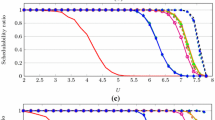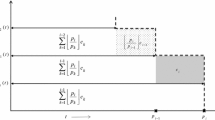Abstract
In most priority scheduling algorithms, the number of priority levels is assumed to be unlimited. However, if a task set requires more priority levels than the system can support, several jobs must in practice be assigned the same priority level. To solve this problem, a novel group priority earliest deadline first (GPEDF) scheduling algorithm is presented. In this algorithm, a schedulability test is given to form a job group, in which the jobs can arbitrarily change their order without reducing the schedulability. We consider jobs in the group having the same priority level and use shortest job first (SJF) to schedule the jobs in the group to improve the performance of the system. Compared with earliest deadline first (EDF), best effort (BE), and group-EDF (gEDF), simulation results show that the new algorithm exhibits the least switching, the shortest average response time, and the fewest required priority levels. It also has a higher success ratio than both EDF and gEDF.
Similar content being viewed by others
References
Ba W, Zhang D B, Li Q, Wang W. The partitioned scheduling of sporadic task systems on heterogeneous multiprocessors. ICIC Express Letters, 2010, 4(4): 1325–1330
Li Y J, Yang Y H, Zhou L, Zhu R B. Observations on using problem specific genetic algorithm for multiprocessor real-time task scheduling. International Journal of Innovative Computing, Information and Control, 2009, 5(9): 2531–2540
Lin J F. Performance analysis and discussion on a heuristic approach for scheduling multiprocessor tasks in a grid computing environment. International Journal of Innovative Computing, Information and Control, 2010, 6(12): 5451–5462
TimeSys Corporation. The concise handbook of Linux for embedded real-time systems version 1.1. 2002, http://www.timesys.com
Bidoki A, Yazdani N, Azhari S V. A logarithmic scheduling algorithm for high speed input-queued switches. Computer Communications, 2008, 31(1): 5–18
Erbas C, Pimentel A D, Cerav-Erbas S. Static priority scheduling of event-triggered real-time embedded systems. Formal Methods in System Design, 2007, 30(1): 29–47
Lam S S, Xie G G. Group priority scheduling. IEEE/ACM Transactions on Networking, 1997, 5(2): 205–218
Cayssials R, Orozco J, Santos J, Santos R. Rate monotonic scheduling of real-time control systems with the minimum number of priority levels. In: Proceedings of the 11th Euromicro Conference on Real Time Systems. 1999, 54–59
Liu C L, Layland JW. Scheduling algorithms for multiprogramming in a hard-real-time environment. Journal of the ACM, 1973, 20(1): 46–61
Bin X L, Yang Y H, Jin S Y. Optimal fixed priority assignment with limited priority levels. In: Proceedings of the 5th International Workshop on Advanced Parallel Programming Technologies. 2003, 194–203
Katcher D I, Sathaye S S, Strosnider J K. Fixed priority scheduling with limited priority levels. IEEE Transactions on Computers, 1995, 44(9): 1140–1144
Cao H J, Jin H, Wu X X, Wu S, Shi X H. DAGMap: efficient and dependable scheduling of DAG workflow job in Grid. Journal of Supercomputing, 2010, 51(2): 201–223
Hansen J P, Zhu H, Lehoczky J P, Rajkumar R. Quantized EDF scheduling in a stochastic environment. In: Proceedings of the 16th International Parallel and Distributed Processing Symposium. 2002, 94–100
Shin C S, Kang M S, Jeong C W, Joo S C. TMO-based object group framework for supporting distributed object management and real-time services. In: Proceedings of the 5th International Workshop on Advanced Parallel Programming Technologies. 2003, 525–535
Li W M, Kavi K, Akl R. A non-preemptive scheduling algorithm for soft real-time systems. Computers & Electrical Engineering, 2007, 33(1): 12–29
Jeffay K, Stanat D F, Martel C U. On non-preemptive scheduling of periodic and sporadic tasks. In: Proceedings of the 12th IEEE Real-Time Systems Symposium. 1991, 129–139
Baker T P. Stack-based scheduling for realtime processes. Real-Time Systems, 1991, 3(1): 67–99
Author information
Authors and Affiliations
Corresponding author
Additional information
Qi Li Received his BS and PhD in control theory and engineering from Dalian University of Technology, China, in 2002 and 2008 respectively. He is an associate professor in Dalian University of Technology. His interests include real-time systems, embedded systems, distributed systems, and network control systems.
Wei Ba Received her BS and PhD in control theory and engineering from Dalian University of Technology, China, in 2003 and 2010, respectively. Currently, she is an engineer in the Science and Technology on Underwater Test and Control Laboratory, China. Her interests include real-time scheduling, real-time communications, and real-time operating systems.
Rights and permissions
About this article
Cite this article
Li, Q., Ba, W. A group priority earliest deadline first scheduling algorithm. Front. Comput. Sci. 6, 560–567 (2012). https://doi.org/10.1007/s11704-012-1104-4
Received:
Accepted:
Published:
Issue Date:
DOI: https://doi.org/10.1007/s11704-012-1104-4




